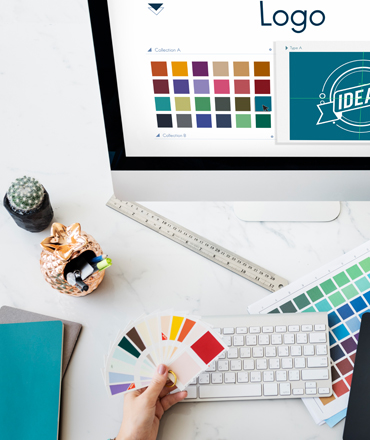


In the digital age, where attention spans are fleeting and brand competition is fierce, a well-designed logo is the emblem that can set your business apart. It’s the face of your brand, the first impression, and the visual representation of everything your company stands for. Logo designing is more than just combining colors and shapes; it's the art and science of crafting a symbol that tells a story, creates an emotional connection, and leaves a lasting mark on your audience's memory.
What Is a Logo?
A logo is the visual ambassador of your brand, the symbol that encapsulates the values, personality, and uniqueness of your business. In a world filled with information overload, a well-crafted logo stands as a beacon, guiding potential customers to your brand amidst the sea of choices. It is your digital handshake, the first impression your audience encounters, and it carries the responsibility of leaving an indelible mark on their minds. A successful logo transcends mere aesthetics; it becomes the face of your brand, a timeless emblem that resonates with your audience and fosters trust, loyalty, and a profound connection.
A well-designed logo ensures that your brand is easily distinguishable in a crowded marketplace.
The more memorable your logo, the more likely it is to be recalled, reinforcing brand loyalty.
A professionally designed logo can convey trust and credibility, reassuring potential customers.
Simplicity is the golden rule of logo design. The most iconic logos in history are often the simplest. Think of the Apple logo or the McDonald's Golden Arches. A simple logo is versatile, easy to remember, and adaptable across various mediums.
Your logo should be directly related to your business. It should reflect your industry, values, and unique selling proposition. A whimsical logo might work for a toy store but not for a law firm. Relevance ensures that your logo doesn't confuse your audience.
A logo should set you apart from the competition. A generic or clichéd logo can easily get lost in the noise. Your logo should be as unique as your brand. It should stand out and make a statement.
Consider where your logo will appear. It needs to look good on everything from business cards to billboards, from websites to social media profiles. A versatile logo is scalable, works in black and white, and remains recognizable in different sizes.
Trends come and go, but a great logo should stand the test of time. Avoid being overly trendy, as this can make your logo look dated quickly. Aim for a timeless design that will remain relevant for years to come.
Professional designers have a natural talent for blending design elements, using colors and fonts in a way that captivates visually and emotionally. Their skills extend far beyond appearances, ensuring the logo conveys brand's identity.
Understanding your brand, your audience, and your competition is crucial. Research helps you identify trends, preferences, and potential design directions.
Start with pencil and paper. Sketch out ideas, concepts, and rough drafts. This phase is about exploration and experimentation.
Once you've refined your sketches, move to digital design tools. Programs like Adobe Illustrator allow for precise vector graphics, which are essential for scalability.
Design is an iterative process. Test your logo in various contexts, get feedback, and make refinements.
Once you're satisfied with the design, finalize it. Ensure it's adaptable to different formats, from print to digital.
Professional designers have a deep understanding of design principles, color theory, and typography.
Logo design is the process of creating a visual symbol or mark that represents a business, brand, or organization. It serves as a unique and memorable identifier.
A well-designed logo is crucial for brand recognition. It conveys your company's values, establishes credibility, and makes a strong first impression.
Logo design costs vary widely, but professional designers typically charge anywhere from $300 to $2,500 or more, depending on complexity and designer expertise.
The timeline for logo design can vary, but it usually takes 2 to 4 weeks. However, it can be longer for more complex projects.
You should share your brand's mission, target audience, preferred colors, and any specific ideas or concepts you have in mind.
Yes, you can trademark your logo to protect it from unauthorized use. It's advisable to consult with a legal professional for the trademark process.
Typically, you'll receive your logo in various formats, including vector files (e.g., .AI, .EPS) for scalability and raster files (e.g., .PNG, .JPG) for various applications.
Yes, logos can be updated or redesigned to reflect changes in your brand identity or to stay current with design trends.
While online tools are available, a professional designer can ensure a unique, custom logo that aligns with your brand identity and goals.
Effective logos are simple, memorable, versatile, and relevant to the brand. They often incorporate appropriate colors and fonts that convey the brand's personality.